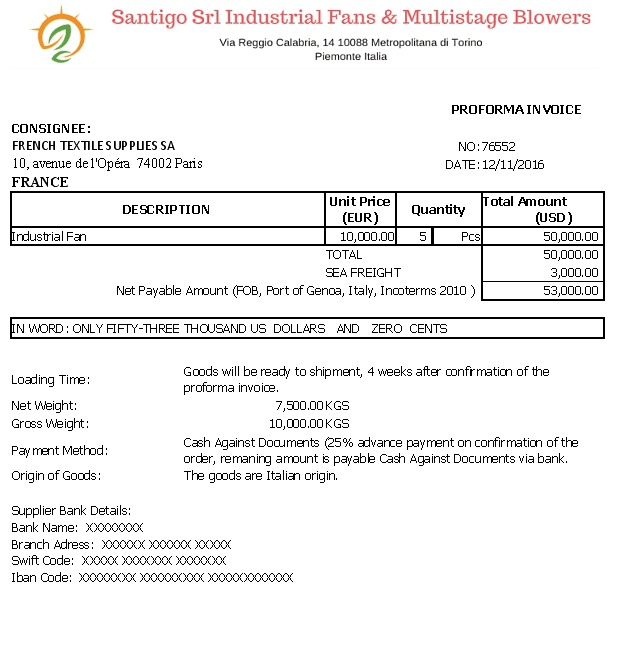Understanding FOB On Invoice: A Comprehensive Guide
When it comes to international trade, the terms and conditions of shipping play a pivotal role in ensuring smooth transactions and clarity between buyers and sellers. One such term that frequently appears on invoices is "FOB," which stands for Free on Board. This term determines when the ownership and responsibility of goods transfer from the seller to the buyer, which can significantly impact shipping costs, risks, and logistics involved in the sale. Understanding FOB on invoice is essential for businesses engaged in importing and exporting goods, as it affects not only pricing but also the overall negotiation process.
In essence, FOB is a shipping arrangement that delineates the responsibilities of both parties involved in a transaction. It is crucial for businesses to clearly communicate the terms of sale and shipping, as misunderstandings can lead to disputes, unforeseen costs, and delays. The FOB designation can vary depending on the point of origin and destination, making it vital for sellers to specify whether the terms are FOB shipping point or FOB destination, which has different implications for risk and ownership.
As we delve deeper into the topic of FOB on invoice, we will explore the various aspects of this crucial shipping term. From its definition to its implications for businesses, understanding FOB can empower companies to make informed decisions regarding their shipping arrangements. By the end of this article, readers will have a clearer understanding of FOB and how it impacts their financial transactions and logistic operations.
What Does FOB Mean on an Invoice?
FOB on an invoice indicates who bears the risk and responsibility for the goods during transit. The two primary types of FOB are:
- FOB Shipping Point: The buyer assumes responsibility as soon as the goods are loaded onto the shipping vessel.
- FOB Destination: The seller retains responsibility until the goods reach the buyer's location.
Why is FOB Important for Businesses?
Understanding FOB is crucial for businesses for several reasons:
- Clarifies responsibility: Knowing when ownership transfers helps prevent disputes.
- Affects pricing: FOB terms can impact total shipping costs and pricing strategies.
- Influences logistics: Different FOB terms can dictate the shipping methods and carriers used.
How Does FOB Impact Shipping Costs?
The choice between FOB shipping point and FOB destination can significantly affect shipping costs. When the buyer assumes responsibility early on (FOB shipping point), they may incur additional charges related to freight and insurance. Conversely, with FOB destination, the seller may need to factor in these costs before setting their prices. It’s essential for businesses to evaluate their shipping strategies based on the FOB terms agreed upon.
What Are the Risks Associated with FOB on Invoice?
Different FOB terms come with varying levels of risk. For instance:
- FOB shipping point exposes buyers to risks during transit.
- FOB destination protects buyers, placing the risk on sellers until delivery.
How to Determine the Right FOB Terms?
Choosing the appropriate FOB terms involves considering various factors:
- The nature of the goods being shipped.
- The reliability of the shipping carrier.
- Cost considerations for both parties.
What Should Be Included in FOB Terms on Invoices?
When drafting invoices that include FOB terms, it’s important to specify the following:
- The type of FOB (shipping point or destination).
- The exact location where responsibility shifts.
- Any additional costs related to shipping and insurance.
How Can Businesses Protect Themselves with FOB on Invoice?
To mitigate risks associated with FOB terms, businesses can take several steps:
- Engage in thorough contract negotiations to clarify terms.
- Consider insurance options for goods in transit.
- Maintain open communication with shipping partners.
Can FOB Terms Change After an Invoice is Issued?
Once an invoice is issued with specific FOB terms, changes can be complicated. Both parties must agree to any modifications, and it’s recommended to document any changes formally to avoid disputes later on.
Conclusion: Mastering FOB on Invoice
In conclusion, understanding FOB on invoice is essential for businesses involved in shipping goods. From determining the responsibilities between buyers and sellers to impacting pricing and logistics, FOB terms play a critical role in international trade. By mastering these terms, businesses can protect their interests and facilitate smoother transactions.
Article Recommendations
- Storm Castle Cafe Menu
- Mark Paul Gosselaar Mom
- Karlyetaylor Nude
- Vegamovies Official
- How Long Is The Simon And Garfunkel Story
- Vontae Davis Autopsy Results
- Helene Joy Partner
- Is Alyssa Naeher Gay
- Anwar Hadid
- Matilda Ledger


